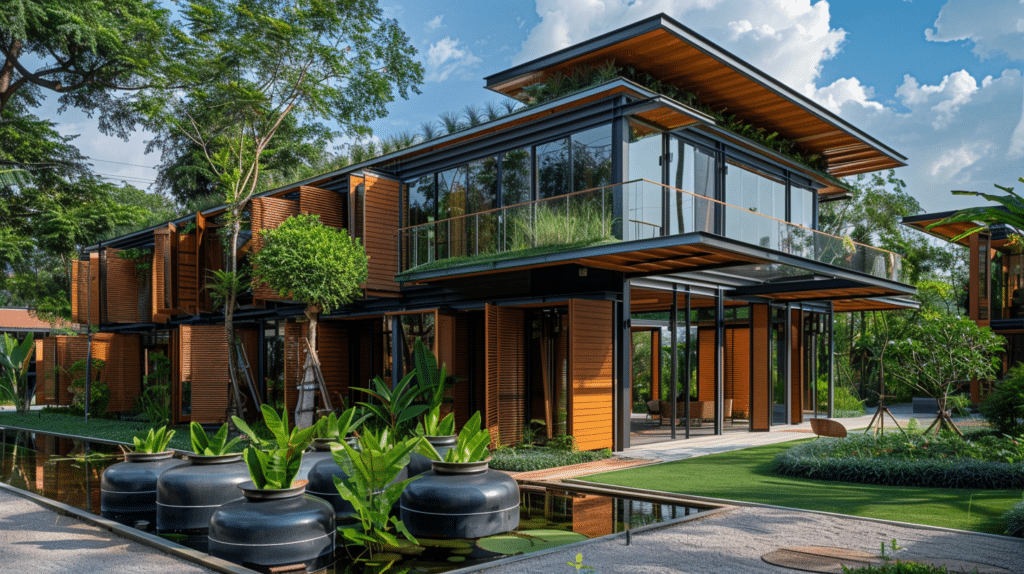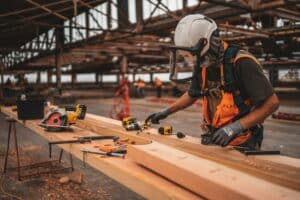In recent years there has been a growing awareness of the importance of sustainable construction practices worldwide and Thailand is no exception. As a beautiful country with a tropical climate and unique biodiversity, Thailand is becoming more committed to preserving its natural environment, reducing greenhouse gas emissions, and creating a healthier living space for its population. As the construction industry accounts for a significant percentage of global carbon emissions, adopting sustainable practices is becoming increasingly important.
At CJ Samui Builders, we are dedicated to helping our clients make informed decisions for their construction projects. With our Western experience and skills combined with local expertise, we are in a prime position to help you implement sustainable practices in your building projects in Thailand. So today, join us as we highlight the different aspects of sustainable construction, discuss the benefits of adopting eco-friendly measures, and provide some practical tips for achieving sustainability in construction projects.
1. Eco-Friendly Building Materials
One of the most significant factors impacting the sustainability of a construction project is the choice of building materials. Opting for eco-friendly materials can greatly reduce the environmental footprint of your building. Here are some popular eco-friendly building materials to consider for your construction project in Thailand:
- Bamboo: This renewable, fast-growing resource is abundant in Thailand and can serve as an alternative to traditional wood or steel. Bamboo is a versatile material with uses ranging from structural support to finishings and furniture. It also has strong and durable qualities, making it an ideal choice for sustainable construction.
- Recycled Construction Materials: Using recycled materials such as reclaimed wood, plastic, and metal can significantly reduce the environmental impact and waste produced during construction. These materials typically require less processing and have lower transportation needs compared to newly manufactured products.
- Green Concrete: Traditional concrete production can be resource-intensive and emit significant amounts of carbon dioxide. Green concrete made by incorporating recycled materials or industrial byproducts has a lower carbon footprint and often performs comparably to conventional concrete in terms of strength and durability.
2. Energy Efficiency and Renewable Energy
Energy efficiency is a crucial aspect of sustainable construction as it can help reduce the operational costs and greenhouse gas emissions associated with a building over time. Some strategies for improving the energy efficiency of your building in Thailand include:
- Passive Design Techniques: Consider the location, orientation, and design of your building to take advantage of natural light and airflows, reducing the need for artificial heating, cooling, and lighting. Such techniques involve strategic window placement, insulation, and shading to optimize energy efficiency.
- Energy-Efficient Appliances and Fixtures: Choose energy-efficient appliances, lighting fixtures, and HVAC systems to minimize the energy consumption of your building. Look for products with ENERGY STAR ratings or equivalents to ensure efficiency.
- Renewable Energy Systems: Incorporating renewable energy solutions such as solar panels or solar water heating systems can help reduce your building’s reliance on non-renewable resources and decrease your carbon footprint. Solar power is especially suitable for Thailand given its sunny climate.
3. Water Conservation and Management
Thailand faces various water-related challenges including frequent flooding and water scarcity during certain periods. Sustainable construction practices can help mitigate these issues and minimize the impact on the local environment. Some water conservation and management strategies to incorporate into your building design are:
- Rainwater Harvesting: Capture and store rainwater for later use, reducing the demand for treated water and easing the strain on local water supplies. This collected water can be used for irrigation, toilet flushing, or even treated for potable use.
- Greywater Recycling: Reuse water from sinks, showers, and washing machines for landscaping or toilet flushing. Greywater recycling can help conserve water and reduce wastewater discharge into the sewage system.
- Low-Flow Plumbing Fixtures: Install low-flow faucets, showerheads, and toilets to minimize water usage without compromising comfort or performance.
4. Waste Management and Reduction
Effective waste management and reduction practices during the construction phase can significantly lessen the environmental impact of your building project. Consider implementing the following waste reduction strategies:
- Plan Ahead: Carefully plan your project to determine the exact quantities of materials needed, minimizing surplus materials and waste.
- Deconstruction Instead of Demolition: Dismantling a structure piece by piece can preserve valuable materials for reuse in the new construction, reducing waste and the need for new materials.
- Environmentally Friendly Disposal: Responsibly dispose of construction waste, ensuring that hazardous materials are separated and properly handled. Recycle or repurpose as much waste material as possible to minimize landfill burdens.
Conclusion
Sustainable construction practices offer numerous benefits from environmental conservation to cost savings and added property value. By incorporating eco-friendly building materials, energy efficiency, water conservation, and waste reduction strategies into your construction projects in Thailand, you can contribute to a greener and more sustainable future for this beautiful country.
As your western-owned and managed construction partner on Koh Samui, CJ Samui Builders is dedicated to helping you implement green building practices and navigate the complexities of the Thailand construction industry. With our locally renowned team, we can ensure your project meets the highest standards of sustainability, all while delivering the high-end quality finishes you deserve. Trust CJ Samui Builders to bring your eco-friendly building dreams to life in Thailand.




